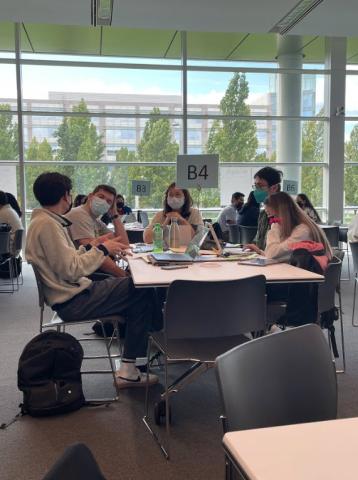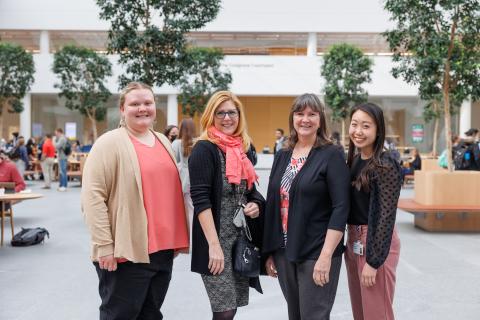Our interprofessional service learning experience for first-year health professions and social work students
Since 2019, the Office for Interprofessional and Interdisciplinary Education and Research has been developing curricula and community experiences for multiple professional programs in which students practice and learn the skills necessary to operate as high impact team members in today’s complex health landscape.

This year in Collaborative Practice I, approximately 530 health and social work students from eight professions work with 77 partner organizations in 82 interprofessional teams to complete 68 community-based projects focused on health and well-being. Each student team is matched with local organizations including shelters, community development corporations, clinics, food banks and workforce development sites to complete a project that has been identified by the partner champion as important to their organization’s work and mission. Student teams then work with the champion over the course of an academic year to complete a deliverable that we hope will help to improve the health and well-being of individuals and communities in Northeast Ohio and beyond.
The student teams are comprised of five to seven students representing three to four professions. The teams meet for two hours every week during the academic year. The student teams spend half of their time participating in classroom-based learning on teamwork and interprofessional service learning topics.
“Working with you and the students of CWRU last year was an amazing and memorable experience. The work, commitment, and results were astounding. It was rather surreal for me personally to listen to all our students present Reach Success....They were fantastic! We look forward to working with you all again this year, and hope to bring even more definitive successes as we now know how this wonderful process works!”
William E. Horning, Founder / President, Reach Success, Inc.
Teamwork topics include the mutual learning approach, team dialogue skills using TeamSTEPPS structured communication tools, project management, psychological safety, collaborative decision-making, conflict management, deconstructive feedback, peer and team assessments and team coaching.
Interprofessional service learning topics include implicit bias and inclusion, structural competency, how the history of Cleveland has perpetuated health disparities, applying systems thinking to community-based projects and implementing change. Through their work with their champion, students learn cultural humility, the value of civic engagement and service to others, and teamwork skills.
Students spend the other half of their time with the community site champion to complete their project. Sites host anywhere from one to three teams, and the champions from the organization typically work closely with a single team. Champions dedicate at least four hours per month to working with Collaborative Practice I students and serve as liaisons between the site and the student team. Champions are critical to the success of the projects and their participation provides a number of mutual benefits to community organizations, site champions, students and our university.

At the end of each academic year each student team presents their deliverable to faculty, peers, and champions and other representatives from our partner organizations at our Collaborative Practice I Showcase. The presentations include a description of the completed deliverable as well as a discussion of the challenges and benefits of working together as a team with a community organization. During the showcase, champions also have the opportunity to share how the team’s partnership has impacted their organization.

